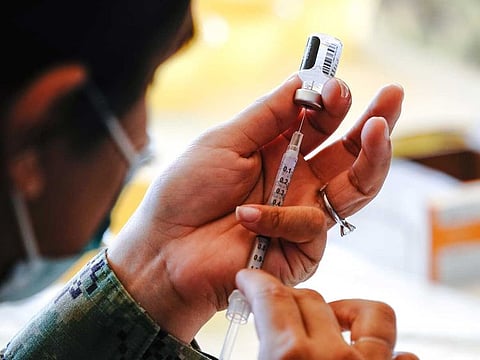India must avoid free vaccine populism
Free vaccination could be given to those who have 'below poverty line' status

The Indian government has announced it is going to vaccinate 30 crore or 300 million Indians against Covid-19. The first priority will be given to health workers, then frontline workers such as police personnel, and then to those above 50 years of age or anyone with serious co-morbidities.
There is one problem here. These 300 million people will get the vaccine for free.
The case to vaccinate everyone for free is a strong one. A single person with the virus can spread it to another person who has not taken the vaccine. Much like the Indian government’s famed polio vaccination, Covid vaccination must ideally be free. For everyone. Just as in US and UK.
Not an ideal time
But we don’t live in ideal times. Amid a recession, the Indian government has been short of cash, both at the centre and in the states. It is unable to print more money for fear of inflation and to protect sovereign bond ratings. In such difficult times, public money should be spent on job creation. Instead of giving free vaccines to those who can afford them, the money should be spent only on those who can’t, and then some money in job creation schemes.
Let’s take the first step. Ten million health workers will get the vaccine free. It makes sense for the government to give the jabs free for health care workers employed by the government. But private doctors, clinics and hospitals can afford to pay. Why should the vaccine be free for them? It’s not as if the government gave them free masks or protection gear. Far from it. So what is the case for free vaccines?
Even among frontline workers, those employed by private organisations in India (such as, say, journalists) don’t need the government paying for their vaccination. What’s of greater concern than the money is the availability of the vaccine. By controlling the first 30 crore vaccines (which means 60 crore shots because it takes two doses), the government will decide when one’s turn comes.
That makes sense perhaps when we are trying to save the most vulnerable. Those with co-morbidities and above 50 years of age. But even among them, why not give a little preferential treatment to those willing to pay? This could be done in a way that the government makes some money, using it to fund more vaccines for the poor.
After a point, it is important to let the forces of demand and supply determine even something as crucial as Covid vaccination. The willingness to pay for the vaccine does not come only from having the money in the pocket but also one’s own assessment of how much one is at risk. Those who have already recovered from Covid, for example, needn’t be prioritised.
Geographical spread of Covid in India
Another problem we are not giving enough attention to is the geographical spread of Covid. Some parts of India have higher infection and mortality rates than others. And this keeps changing. Some cities may have already achieved herd immunity of sorts if the sero-surveillance surveys are to go by. Therefore, the districts and states which seem to be suffering the most currently should be the first to get the vaccine.
That sounds obvious, but only until politics enters the picture. Kerala chief minister Pinarayi Vijayan has announced free vaccination for all citizens. Kerala elections are just a few months away. Bihar chief minister Nitish Kumar, having just survived a humiliating election season, has also announced free vaccination for everyone. He must hope it shores up his ratings.
Other states where governments have made noises about giving everyone the Covid-defeating shots for free include Madhya Pradesh and Tamil Nadu. Karnataka and Gujarat have seen vague statements hinting at free vaccines. State governments just don’t have the money to afford this.
Facing the pressure, some Congress-ruled states have demanded the central government pay to vaccinate every single person for free. The competitive populism over the Covid vaccine is madness. Someone needs to stop this.
The only state that has talked sense is Maharashtra, where health Rajesh Tope has demanded the Centre pay for the vaccination of only those who have “below poverty line” status.
The central government claims to have extended its flagship public health insurance scheme, Ayushman Bharat, to 53 crore or 530 million Indians. This carries a cover of Rs5 lakh per family. The government can easily use this scheme to give free vaccines to those covered by it. These are also the people who need such a subsidy the most.
For the rest of us, let us pay for our own well-being.






